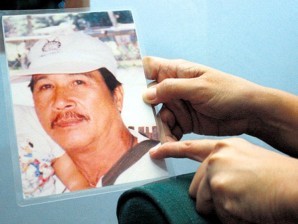This is one Unsay that is loved

Reynafe Momay-Castillo points to a picture of her father, Reynaldo Momay, a photographer for Midland Review. The grandchildren of Reynaldo, have learned to love their pet dog “Unsay” even though it is the nickname of the principal suspect in the grisly mass murder that snuffed out the life of their grandfather and those of 57 other people three years ago on Friday. JEOFFREY MAITEM/INQUIRER MINDANAO
ISULAN, Sultan Kudarat—The grandchildren of Reynaldo Momay, one of the victims of the Maguindanao massacre, have learned to love “Unsay” even though it is the nickname of the principal suspect in the grisly mass murder that snuffed out the life of their grandfather and those of 57 other people three years ago on Friday.
On the advice of a psychologist, the boys’ mother bought two mongrel puppies in an effort to calm the rage they felt at the mention of the name Andal “Unsay” Ampatuan, the alleged mastermind of the Nov. 23, 2009, massacre of 58 people in Maguindanao.
Killed in what is now simply referred to as the Maguindanao massacre, the worst case of election-related violence in the country’s history, were 58 people, 32 of them media workers, including Momay, photographer of Midland Review in Tacurong City.
But Momay’s family has learned to love Unsay, their three-year-old mutt.
Reynafe Castillo, Momay’s daughter, recalled that days after the massacre, her sons’ aggressive behavior was too difficult to handle. Whenever they saw Andal Ampatuan Jr.’s face or heard his name mentioned on television, Ralph, 18, and RJ, 14, would go into a rage and unleash a torrent of expletives and curses.
“Acting out their anger, grief, they tossed stuff at the television set,” Castillo said in a Facebook chat with the Inquirer. “Who could blame them? They are Lolo’s boys. They had such a special emotional bond.”
The entire family shared the same suffering. Castillo, overwhelmed by deep pain, sought ways to calm the anger in her sons’ hearts. “How could I shift their focus from anger?”
By January 2010, government-led agencies held a series of psychosocial interventions to comfort the victims’ families.
“Find a way that would put them at ease with the name Unsay,” a psychologist friend told Castillo.
Thus in February 2010, when a neighbor put up puppies for sale, she bought two, a male and a female and named them Unsay and Bai Dido, after Unsay’s wife.
“The intention was to bring Unsay and Bai Dido closer to us, to lessen their heavy burden because they would call them often. Dogs are meant to be cared for,” Castillo explained.
Soon after, they gave up Bai Dido to a relative in Bukidnon. “The dog received much beating and kicking. I can’t blame the children. The pain was there. But I held on to (Unsay) because I believed that they would eventually learn to show affection to Unsay.”
In the first weeks, the dog showed signs of trauma.
“Unsay went into hiding each time his name was called. He knew we were upset,” she said.
Despite the cold treatment, the dog got food, water, grooming and returned these favors.
“We may have had tough and horrendous days, but Unsay welcomed us, his tail wagging upon our entry at the gate. He was still warm, sweet. He accepted the way we were,” Castillo said.
After two months, Castillo said, her boys had a change of heart and began treating the dog the way it should be treated.
“He is an intelligent dog. Nakakagawa ng paraan. At times he would run after people off the street but he has not hurt anyone. Kinatatakutan siya. He is well taken care of, groomed. The children began stroking and calming Unsay. And the dog responded. Hindi naman lahat na may pangalang Unsay ay masama,” Castillo said.
Psychologist Virgie Lacadman agreed to the use of pets in healing children torn up by anger and grief.
“This method can help a child unlock his inner self and promote healing. They will learn to become responsible and be trusting,” Lacadman said.
“It was a normal reaction to an abnormal situation. Anger results from real or perceived injustice. It shows power and control,” she said.
Castillo said they have also long forgiven Unsay, the person. “But not what he has done. May nagawa siyang kasalanan. Pumatay siya. I understand his parents never guided him well. That’s why he grew up a violent man,” she said.
In August this year, Castillo and her sons left for the United States where she works as a nurse, leaving Unsay in the care of an aunt.
“I miss our pet Unsay. My aunt is taking care of the dog. One time my mother told me and my kids that she was going to give Unsay to a neighbor. My youngest son objected to it,” she said.
Rochelle Regodon, campaign manager of the People for the Ethical Treatment of Animals (Peta), said no one should ever adopt a dog, or any animal, with the intention to abuse them.
“But what this story does is show that dogs give unconditional love. While not everyone is able to take in and care for a companion animal, we encourage those who can—those with the time and resources and who can commit to looking after them for life—to do so. There are many dogs and cats languishing on the streets and in the city and provincial pounds in need of loving homes,” Regodon said.
“We hope this story will inspire people to promote compassion by condoning violence to both humans and non-humans. Abuse to animals should never be tolerated, as studies show that people who were cruel to animals moved on to human victims later on in life. Instilling in children a sense of compassion today is the only way to prevent violence tomorrow,” she added.














